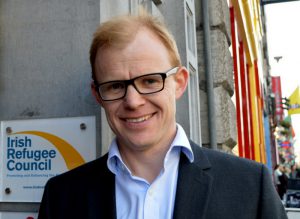Voluntary return incentives branded ‘unethical and inappropriate’

Nick Henderson
The Irish Refugee Council has condemned a government initiative offering asylum seekers more money to leave Ireland as “unethical and inappropriate”.
People who have no legal status in Ireland, or whose application for international protection has been either withdrawn or refused, can access “reintegration assistance” if they agree to a voluntary return.
The level of reintegration assistance previously on offer was up to a maximum of €1,200 per person or €2,000 per family unit.
However, for a limited time, sums of up to €2,500 per person or €10,000 per family will be available depending on how early a person agrees to a voluntary return.
Justice, home affairs and migration minister Jim O’Callaghan said the changes were designed to “relieve pressure from our international protection system by reducing the number of people in the process who are not going to be successful”.
Nick Henderson, CEO of the Irish Refugee Council, said the charity strongly opposed the policy as it is “specifically directed at people still in the protection process”.
“While voluntary return is preferable to forced deportation, it is only appropriate at the end of the process — we should not be paying people in need of safety to abandon their claims,” he said.
“Ireland has been and must remain a nation that offers refuge. People in the protection system are in extremely vulnerable positions, often living in or close to poverty.
“To email them while they are still in the process, with an outstanding decision, many of whom have waited many months or years, proposing a cash payment to encourage them to return to their country is deeply concerning.
“This is particularly troubling in the context of the 30 per cent of appeals being successful in 2024 and therefore many having an application that has a reasonable prospect of success.
“Regardless of this, people have a statutory right to appeal and it is fundamental to any international protection process.”
The Irish Refugee Council has also called on the Department to refrain from direct communication of this nature with applicants.
Mr Henderson said: “We have written to the Department of Justice today to request that it does not communicate directly with people in the protection process by email.
“Such contact risks creating additional distress and confusion among a group of people who are already in highly precarious situations.”
The organisation also criticised the Department’s failure to engage with stakeholders before announcing the scheme.
“Organisations that support people in the protection process — many of which are already overstretched — are now likely to receive calls and queries about this scheme without having been given any information or opportunity to prepare,” Mr Henderson said.









